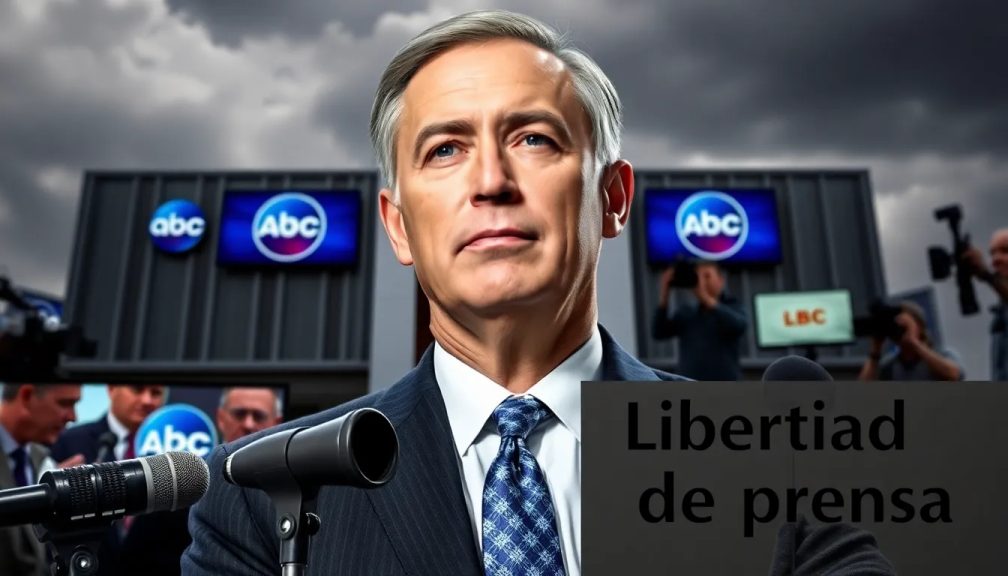FCC chairman denies threatening ABC station licenses

In a recent turn of events, Federal Communications Commission (FCC) Chairman Brendan Carr has found himself at the center of a controversy regarding his comments on the popular television host Jimmy Kimmel. While Carr insists that he never issued a threat to revoke licenses from ABC stations if they did not take action against Kimmel, many observers, including members of both political parties, disagree. This situation raises significant questions about the FCC's influence over media content and the implications for free speech in the United States.
As the discussion unfolds, it's essential to delve deeper into the nuances of this issue, exploring the responsibilities of the FCC, the implications of Carr's statements, and the broader context of media regulation in America.
- Brendan Carr's claims and the public response
- The implications of Carr's statements
- The controversial history of the FCC's regulatory powers
- Legal perspectives on the FCC's actions
- Responses from political figures and industry leaders
- The current state of Jimmy Kimmel's show
- Future implications for FCC regulations
Brendan Carr's claims and the public response
During a recent appearance at the Concordia Summit, Carr asserted that he never threatened Disney or ABC regarding Kimmel's show. He condemned claims made by Senate Democrats, stating that they misrepresented the FCC's actions. Carr stated, "There's a lot of Democrats out there that are engaged in a campaign of projection and distortion."
However, the reality appears to be more complex. Many individuals, including prominent Republicans, interpreted his words as a clear threat. Following Carr's remarks about potential license revocations due to "news distortion," Disney temporarily suspended Kimmel's show. This decision was met with significant backlash from the public, prompting ABC to reinstate the program shortly thereafter.
The implications of Carr's statements
Carr's insistence on his innocence raises interesting questions about the power dynamics between the FCC and media companies. While he portrays himself as a neutral arbiter, the language he used in prior statements indicates otherwise. His comments included phrases like "We can do this the easy way or the hard way," which many interpret as coercive.
In defending his position, Carr claims he merely described a hypothetical process where local TV stations could file complaints against Disney for alleged news distortion. Yet, these explanations do little to assuage concerns that his statements were indeed intended as a warning.
- The FCC has historically been responsible for regulating interstate and international communications.
- Concerns about government overreach and censorship are at the forefront of this debate.
- Public opinion plays a significant role in the decisions made by media companies, as demonstrated by Kimmel's reinstatement.
The controversial history of the FCC's regulatory powers
The FCC's authority to regulate content has been a contentious issue for decades. Originating from the Communications Act of 1934, the FCC was established to promote fair competition, prevent monopolies, and protect the public interest. However, the agency's role has evolved, leading to debates over its reach and the implications for free speech.
Carr's invocation of the FCC's rarely enforced news distortion policy from the 1960s has raised eyebrows. Critics point out that the agency has not made a finding of news distortion since 1993, raising questions about the relevance and applicability of such regulations in the contemporary media landscape.
Legal perspectives on the FCC's actions
Legal experts from various think tanks, including the Cato Institute and the American Enterprise Institute, have weighed in on Carr's comments. They argue that his statements could be interpreted as an explicit threat against Disney. Thomas Berry from the Cato Institute noted, "It's hard not to read [Carr's statement] as a fairly explicit threat to punish Disney if they didn't take Jimmy Kimmel off the air."
Moreover, the potential ramifications of the FCC's coercive actions on free speech have sparked concern. Carr suggests that the decision to suspend Kimmel's show was driven by local TV stations' frustrations with Disney's control. However, many believe this rhetoric obscures the reality of government influence over private content decisions.
Responses from political figures and industry leaders
Even within Carr's own party, reactions have been mixed. Senator Rand Paul criticized Carr's intervention, stating, "Brendan Carr has got no business weighing in on this." Similarly, Senate Minority Leader Mitch McConnell echoed these sentiments, emphasizing that government involvement in media content decisions is inappropriate, regardless of personal opinions on the material being aired.
These bipartisan criticisms of Carr's actions reflect a growing concern about the FCC's role in regulating content, particularly when it intersects with First Amendment rights. As the lines blur between regulatory oversight and censorship, industry leaders and lawmakers alike are grappling with the consequences of such government intervention.
The current state of Jimmy Kimmel's show
Despite the controversy surrounding Carr's statements, Jimmy Kimmel's show is set to return to many ABC affiliate stations. While Nexstar and Sinclair, two major broadcasting companies, have decided against airing the program, other local stations like Gray and Hearst are set to continue with their scheduled broadcasts.
This divergence in response among local stations highlights the varying degrees of influence that national programming companies have over regional content decisions. Carr's assertion that local TV stations are asserting their independence is only partially accurate; the reality is more complicated and often driven by corporate interests.
Future implications for FCC regulations
The ongoing debate surrounding Carr's comments and their implications raises critical questions about the future of FCC regulations and their impact on media freedom. As the commission navigates its role in a rapidly changing media landscape, it must balance the need for oversight with the principles of free speech.
Moreover, Carr's recent remarks have drawn attention to the potential for government pressure on media companies, particularly those with pending business deals before the FCC. Anna Gomez, the only Democrat on the Republican-majority FCC, voiced concerns about the vulnerability of billion-dollar companies to government influence, saying, "I want to thank those Americans from across the ideological spectrum who spoke loudly and courageously against this blatant attempt to silence free speech."
As this situation develops, it will be crucial to monitor the FCC's actions and the broader implications for media regulation in America. The outcomes could set significant precedents for how government agencies interact with private media companies, shaping the future of free expression in the country.



Leave a Reply